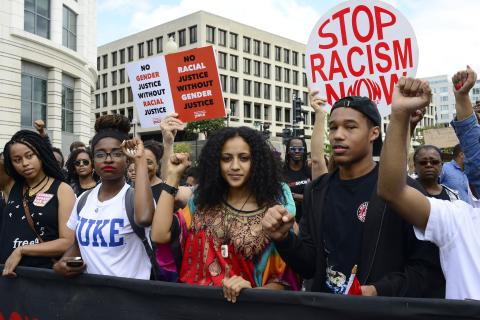Call for Resources on Racial Justice
NCFR remains committed to racial justice in the organization and the areas in which we work. As a continuation of the Board’s Racial Justice Initiative, we are curating racial justice resources for the NCFR website for use in our research, practice, and teaching as well as in our places of employment (e.g., education, health, family services, government, and other organizations).
We are asking members to contribute to this effort by submitting resources relevant to promoting racial justice in Family Science for possible inclusion in a new Racial Justice Resource webpage. We are interested in receiving scholarly articles, books, curriculums, classroom activities, data tools, infographics, videos, webinars, podcasts, research briefs, and websites (that may serve as a thorough explanation of subject or be a gateway to more resources on a dedicated subject).
Authorship will be credited for each item that is posted. Direction will be provided to authors of original materials on how to maintain ownership of those materials.
We are seeking resources for the following six areas:
-
Promoting racial justice as we theorize
Example: Walsdorf, A. A., Jordan, L. S., McGeorge, C. R., & Caughy, M. O. (2020). White Supremacy and the Web of Family Science: Implications of the Missing Spider. Journal of Family Theory & Review, 12(1), 64-79. https://doi.org/10.1111/jftr.12364 -
Promoting racial justice as we conduct research
Example: Groos, M., Wallace, M., Hardeman, R., & Theall, K. P. (2018). Measuring inequity: A systematic review of methods used to quantify structural racism. Journal of Health Disparities Research and Practice, 11(2), Article 13. https://digitalscholarship.unlv.edu/cgi/viewcontent.cgi?article=1792&context=jhdrp -
Promoting racial justice as we teach
Example: National Museum of African American History & Culture. (n.d.). Talking About Race. https://nmaahc.si.edu/learn/talking-about-race/topics/bias -
Promoting racial justice as we mentor and train
Example: Reddick, R. J., & Young, M. D. (2012). Mentoring graduate students of color. In S. J. Fletcher, & C. A. Mullen (Eds.), The SAGE Handbook of Mentoring and Coaching in Education (pp. 412-429). Sage Publishing. http://dx.doi.org/10.4135/9781446247549.n28 -
Promoting racial justice in the places we work
Example : Statement on Student Evaluations of Teaching, American Sociological Association. www.asanet.org/sites/default/files/asa_statement_on_student_evaluations_of_teaching_feb132020.pdf -
Promoting racial justice in the services we provide
Example: Harris, D., Phillips, T., & Clark, T. (2021). Supporting Families That Are Raising Black Children in a Racialized Society [Webinar]. National Council on Family Relations.
www.ncfr.org/events/supporting-families-are-raising-black-children-racialized-society
Feel free to provide additional resources outside of these areas as other collections could be curated.
Submitting Resources
Please include the following information when submitting a resource for the Racial Justice Resource webpage:
- The full title
- The author(s)
- If published, the year the resource was published
- Resource Type
- Resource in APA 7 format
- Relevant keywords (if not apparent from the title)
- If it is peer-reviewed
- Which area this resource best fits
- If published, a web address link to the resource (if it is a scholarly article behind a paywall, be sure to link to the public abstract
- One to two sentences describing this resource.
- One to two sentences explaining why you believe it is appropriate for the resource collection.
Upload submissions here. Submissions will be accepted on an ongoing basis.
Contact Emily Vang at NCFR with questions.


